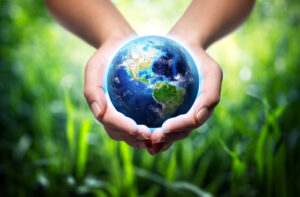PRIORITIZING SUSTAINABILITY
Great American Packaging believes in doing our part to help save the planet. We are dedicated to creating a clean and healthy workplace for our employees, our customers and for the environment.
OUR COMMITMENT
- We recycle 100% of our plastic industrial waste
- Exceed industry requirements for AQMD VOC removal
- Maintain compliance with Storm Water Regulatory Programs
- Continually challenge our teams to meet a goal of zero waste across our entire facility
- Perform GFSI audits for food safety annually
- We offer a complete portfolio of Sustainable Packaging Solutions, including No PFAS Added, Compostable, Recyclable and Plant-Based options.
PLASTICS & THE ENVIRONMENT
Sustainability can be a complex and dynamic topic. It is important to understand the holistic lifecycle of a product to grasp its impact on the circular economy. As an example, plastic requires less energy to produce and contributes a lower carbon footprint than other packaging materials.
- Greenhouse Gas Savings: Based on a study published by the American Chemical Society in January 2024, plastic products release 10% to 90% fewer emissions across the product life cycle. Furthermore, in some applications, such as food packaging, no suitable alternatives to plastics exist. *
These results demonstrate that care must be taken when formulating policies or interventions to reduce plastic use so that we do not inadvertently drive a shift to nonplastic alternatives with higher GHG emissions. For most plastic products, increasing the efficiency of plastic use, extending the lifetime, boosting recycling rates, and improving waste collection would be more effective for reducing emissions.*
- Helps Reduce the Amount of Food Waste: In the United States, food waste is estimated at between 30–40 percent of the food supply… In 2023, the USDA, EPA and FDA released a national strategy that will drive progress toward the national goal to reduce food loss and waste in the U.S. by 50% by 2030.** Plastics food packaging delivers more efficient protection, reduces food waste and extends shelf life.
- Recyclable* and Reusable: Polyethylene is a thermoplastic material which means it can be recycled with very low amounts of energy or chemical residue. It can be melted and reused a number of times.
* Replacing Plastics with Alternatives Is Worse for Greenhouse Gas- American Chemical Society.pdf
** https://www.fda.gov/food/consumers/food-loss-and-waste
*** Use of the term “Recyclable” is not applicable for LDPE from virgin resins used, distributed or sold in California. LDPE products from virgin materials do not meet the requirements for recyclability in California as set forth in SB 343 by Cal Recycle.



